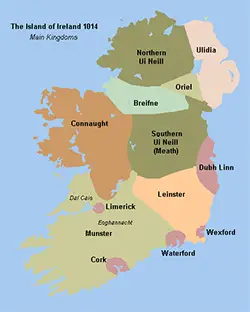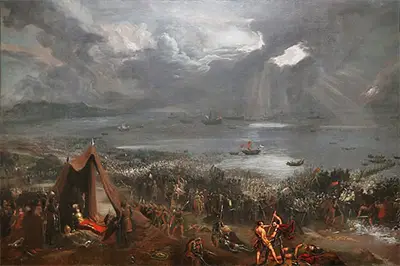The Battle of Clontarf was the beginning of the end of the Viking occupation of Ireland. The victory for High King Brian Boru made him a national hero.

Brian Boru had defeated the Vikings in a number of battles in order to secure rule over the kingdom of Munster and then, in 1002, had become High King of Ireland. All other kings were supposed to pay homage to him, including sending him hostages. Some did so very reluctantly. Even in the face of continued Viking incursions, the various petty kingdoms of Ireland were fighting among one another, in some cases choosing an alliance with a Viking army in order to defeat a fellow Irish army.
In 1013, the King of Leinster, Máel Móorda, joined with his nephew, King Sitric Silkenbeard of Dublin, to rise up against the high king. The Vikings had established a market town and stronghold at Dublin in 838 and had expanded their influence in and around the town. The Dublin Vikings found themselves popular allies in the internecine struggles for which Ireland has long been famous.

Boru responded by raising an army and laying siege to Dublin. The siege began near the end of 1013; Boru called off the siege not long after it started, with the intent of instituting another one in the spring. He chose instead to ravage territory north of the River Liffey. The result was a pitched battle, which took place at the Clontarf Weir. Supporting the Viking army was a fleet commanded by the warrior Bródir. Even so, Boru's force outnumbered that of his opponents.

Neither Sitric nor Boru fought in the battle; rather, they let their commanders organize the troops. The battle lasted the length of a day, which many sources say was April 23, 1014. Near the end of the day, with most of its numbers dead or wounded, the Irish-Viking force retreated and Boru had his victory. He did not have long to savor it.
Bródir, fleeing in retreat, ran through Boru's camp, found the high king praying, and slew him in his tent. The high king's men capture BRódir and exacted their revenge on the Viking leader.
The Battle of Clontarf ended in victory for High King Brian Boru. However, he lost his own life that day, as did his son Murchad and his grandson Tairdelbach. The Vikings, in Dublin and elsewhere, went into a gradual decline; their waning influence lasted until the Normans arrived in 1169.